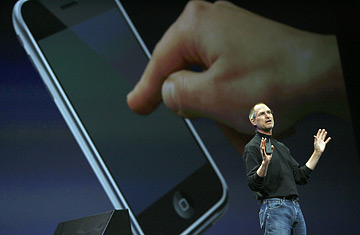
Apple chief executive Steve Jobs unveils a new mobile phone that can also be used as a digital music player and a camera, a long-anticipated device dubbed an "iPhone."
(4 of 5)
Of course, Apple's other secret weapon is the controlling hand of Steve Jobs, 51, for whom this is an almost mystically significant year. It has been five years since the iPod launched, 30 years since Jobs co-founded Apple (with Stephen Wozniak) and 10 since he returned there after having been fired. In that decade, Apple's stock has gone up more than 1,500%. Neither age nor success--nor cancer surgery in 2004--has significantly mellowed him, although some of the silver in his beard is creeping up into his hair. All technologists believe their products are better than other people's, or at least they say they do, but Jobs believes it a little more than most. He calls the iPhone "the most important product Apple has ever announced, with the possible exception of the Apple II and the Macintosh. It's also going to be an incredible revolution for the whole industry."
Jobs' zeal for product development--and enforcing his personal vision--remains as relentless as ever. He keeps Apple's management structure unusually flat for a 20,000-person company, so that he can see what's happening at ground level. There is just one committee in the whole of Apple, to establish prices. I can't think of a comparable company that does no--zero--market research with its customers before launching a product. Ironically, Jobs' personal style could not be more at odds with the brand he has created. If the motto for Apple's consumers is "Think different," the motto for Apple employees is "Think like Steve."
The same goes for Apple's partners. The last time Apple experimented with a phone, the largely unsuccessful ROKR, Jobs let Motorola make it. "What we learned was that we wouldn't be satisfied with glomming iTunes onto a regular phone," Jobs says. "We realized through that experience that for us to be happy, for us to be proud, we were going to have to do it all."
Apple's superiority complex can inspire resentment, which is one reason for some of the Silicon Valley schadenfreude over Jobs' current stock-options woes (see sidebar). An internal investigation has cleared Jobs, but a federal investigation and a shareholder lawsuit are still going forward. (Jobs declines to talk about the options issue.) Taking pleasure in seeing a special person knocked down to size is a great American pastime. But there's no point in pretending that Jobs isn't special. A college dropout whose biological parents gave him up for adoption, Jobs has presided over four major game-changing product launches: the Apple II, the Macintosh, the iPod and the iPhone; five if you count the release of Pixar's Toy Story, which I'm inclined to. He's like Willy Wonka and Harry Potter rolled up into one.
